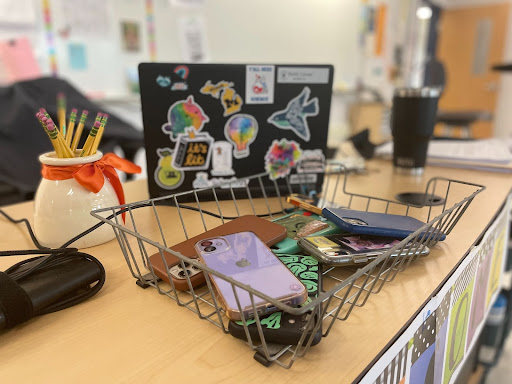Students stuck on cell phones

Photo courtesy of Muhammad Kiyani
Some teachers have alternative methods of curbing phone usage in their class, such as collecting phones and returning them when the bell rings.
May 26, 2022
Phones are now banned in Herndon High School classrooms, but cellular deprivation for all should not be the solution for the academic apathy of a few phone fiends.
According to Herndon’s principal Liz Noto, cell phone usage among students has increased exponentially in recent months. The ‘all-time high’ claim prompted the administration to implement this strict policy prohibiting phones and headphones from being used in classrooms.
“Students who are serious about their education will pay attention regardless, and students who value using cellphones more would find loopholes to do it,” said Herndon junior Maria Rahman.
Punishing an entire population of students, most of whom use their devices responsibly, is unfair, especially when academic information can be easily accessed via phones.
“Cell phones are an essential part of my daily life because I use my phone during the school day to communicate with people, search unknown terms, and quickly look up [questions],” explained Rahman.
At Herndon, the consequences for having a phone out in the classroom include calls home, meetings with administrators, detentions, and even suspensions. Following through with such extensive procedures may take away more time and resources that could have been utilized toward learning.
“Some students being addicted to their phones and not socializing in real life does not justify how the administrator forces such harsh rules on ALL students,” expressed Rahman.
At WS, a similar policy is on the horizon as the Student Rights & Responsibility guidelines will be adjusted to include a nearly identical phone ban preventing phone usage within classrooms. This policy is expected to be implemented at the beginning of the 2022-2023 school year.
“We were notified [about the upcoming change] via reports from the School Board work session to discuss the matter,” said teacher Craig Brown. “While banning is harsh, it is necessary [in my opinion] to help everyone reset. Additionally, the ban does not need to last forever but long enough to create changes in behaviors.”
Schools should focus instead on preventative measures rather than reactionary ones. Creating a better classroom environment and atmosphere would prevent phone usage. Consequences should only escalate if a student refuses to cooperate after multiple warnings. Even then, the implementation of such consequences should not take away valuable class time from other students.
“First, you get a warning. Second, you put your phone in the teacher’s desk for the remainder of the period (you get it back at the end of class). Third, if your cell phone behavior is a habitual problem, the teacher calls home and writes a referral (this referral is for failure to abide by the classroom rules/expectations NOT the cell phone),” suggested Brown in regards to effective regulation methods.
In the end, students are responsible for their own learning. If someone decides to play games during class instead of paying attention, the accountability should belong to them and only them—not an entire class.




